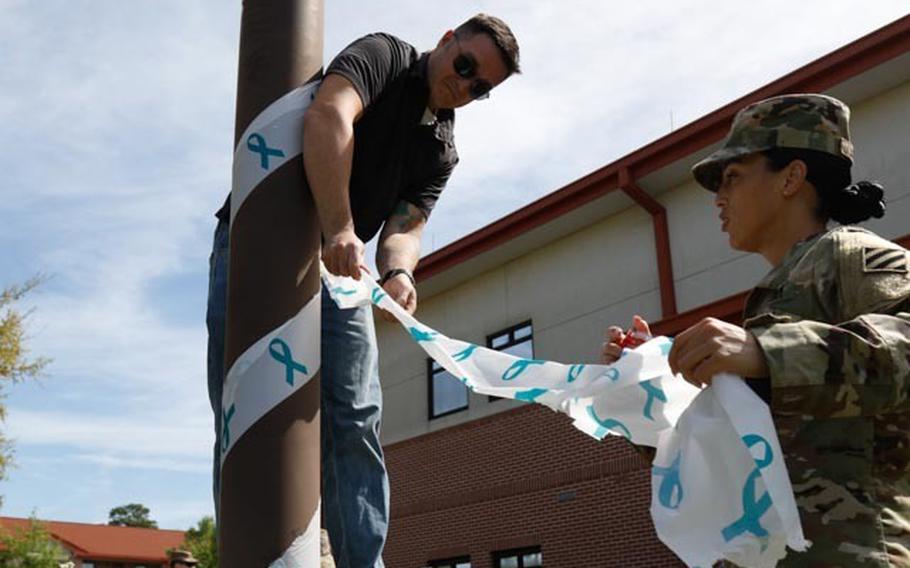
Staff Sgt. Taylor Pruss, victim advocate for the 603 Aviation Support Battalion, 3rd Combat Aviation Brigade, 3rd Infantry Division, and 1st Lt. Aniko Austin, victim advocate for Headquarters and Headquarters Company, 3rd CAB, 3rd ID, set up displays for Sexual Assault Awareness and Prevention Month at Hunter Army Airfield, Ga., on April 1, 2022. (Caitlin Wilkins/U.S. Army)
WASHINGTON — The Army is implementing two new policies taking aim at sexual assault and other serious crimes a year after a Pentagon-ordered commission report found the military was ill equipped to address such issues properly.
The policies — one that creates a new prosecution office focusing on 11 crimes including rape and child pornography, and another that makes it easier for victims to report sexual assault — come as a result of the July 2021 Pentagon report that made 80 recommendations to help the military tackle pervasive problems with sexual assault and harassment in the ranks.
The policies also come after the Army faced bitter criticism in the wake of the April 2020 death of Spc. Vanessa Guillen, who had reported she was sexually harassed by her supervisor at Fort Hood, Texas, but leaders failed to take appropriate action, according to an ensuing investigation. The supervisor created “an intimidating, hostile environment” in her unit, the investigation found. Guillen was later killed by another soldier, Spc. Aaron Robinson.
The first new initiative creates an Office of Special Trial Counsel that will solely prosecute specific offenses: murder, manslaughter, rape, sexual assault, child rape, sexual assault of a child, “other sexual misconduct,” kidnapping, domestic violence, stalking, retaliation, child pornography and “wrongful broadcast,” according to the Army.
Lt. Gen. Stuart Risch, the judge advocate general, will certify select active-duty attorneys, known colloquially as JAGs, to serve as “special trial counsel,” who will focus their caseloads on those involving the specified crimes. He will later appoint a certified special trial attorney to become the first general officer to lead the new special trial office.
The new office is a result of the recommendation in the Pentagon report to separate the prosecution of sexual assault cases from the chain of command, an issue that was hotly debated before being codified in the 2022 National Defense Authorization Act, which establishes military priorities and budgets for the Defense Department.
“Only prosecutors have the technical training to make the purely legal decisions that affect victims’ access to justice,” the Pentagon report concluded.
Previously, unit commanding officers decided whether a report of sexual assault should be sent to trial. That will now change after the report found a commander’s position within a unit leads to an inherent appearance of a conflict of interest.
“Commanders are not lawyers, and they do not receive adequate training regarding victimization, implicit bias and the impact these concepts have on the administration of justice,” according to the report.
The second new initiative implements the Pentagon’s newly established Safe-to-Report policy meant to encourage troops to report sexual assaults by protecting them from being disciplined for minor misconduct in which they might have participated while they were victimized.
The initiative is designed to encourage victims to report their assaults without fear of punishment for “collateral misconduct” that might be discovered in an ensuing investigation, such as an underage drinking, curfew violations or having an “unprofessional relationship” with the accused, according to the policy.
The Navy also recently implemented the same policy.
Pentagon studies have shown that service members consider disciplinary action against them to be a “significant barrier” to reporting sexual assault, Army Resilience Directorate director James Helis said in a statement Thursday.
“This directive helps reduce the stigma associated with reporting, so offenders can be held accountable for their actions and victims can get the support they need to heal,” he said.
Senior Army commanders are now required to assess whether a victim’s associated misconduct is considered minor or non-minor “based on their analysis of aggravating and mitigating circumstances” before determining whether to punish them, the service statement said.
Aggravating circumstances include whether the action threatened a military mission or objective, harmed others or damaged government property. Aggravating factors will not necessarily require the victim be disciplined for the misconduct but should be used to determine whether punishment should be issued.
Mitigating circumstances include the victim’s age, whether the perpetrator had authority over the victim, and whether the victim engaged in the misconduct after the assault, “which may be related to symptoms of trauma,” according to the policy.
While commanders now have the discretion not to prosecute victims’ minor misconduct, they may still refer such victims to substance abuse screening, mental health or other medical providers to determine the soldier’s fitness for duty or temporarily suspend them from certain critical positions, the policy states.